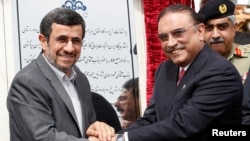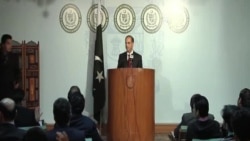ISLAMABAD —
Pakistan President Asif Ali Zardari is in Iran to inaugurate the construction of a new pipeline that could supply energy-starved Pakistan with natural gas. The project could risk incurring international sanctions surrounding Tehran's nuclear program.
President Asif Ali Zardari and Iranian leader President Mahmoud Ahmadinejad are launching the construction of a multi-billion-dollar pipeline that would pump badly-needed natural gas into Pakistan.
A ground-breaking ceremony was arranged at the border between the two countries, despite serious concerns on the part of the United States.
Washington has imposed a series of sanctions on Iran and those found to be dealing with Tehran, because of its nuclear program.
But Pakistan Foreign Ministry spokesman Moazzam Khan has made it clear Pakistan's energy needs trump concerns about possible sanctions. "We have said this repeatedly that Pakistan, being [an] enormously energy-deficit country, it is in our national interest to have this project," he explained. "And we are committed to have this project."
Related pipeline video clip:
U.S. State Department spokeswoman Victoria Nuland warned last week, if the deal is finalized for the proposed pipeline, it would raise "serious questions" under Washington's Iran Sanctions Act. She says the United States is working with Pakistan on alternative energy sources, such as a gas pipeline from Turkmenistan in Central Asia and increasing hydro-power.
But Zardari has insisted that the project with Iran is of immense economic importance to Pakistan and should not fall under the sanctions regime. "The world and other countries have given other nations permission to be doing business inclusive of these sanctions, so I do not see why we cannot engage the world and make sure that the world understands our point of view and Pakistan also gets a waiver for this project," he stated.
The pipeline project has been in the works since 1994. And, there are questions whether the push to build the pipeline now - just weeks before the government is to face national elections - is more of a vote-winning ploy or actual policy.
Pakistan has been enduring daily blackouts and chronic energy shortages, affecting businesses and homes, for several years. Pakistan officials have said the pipeline could come online by the end of 2014.
Rashid Mehmood,who has been waiting in line for compressed natural gas for his car, welcomes the deal with Iran. "I am very happy and our nation is very happy for this agreement which is signed by President Zardari," he said. "It is one of the most important and very beneficial agreements [of the] last five year[s]"
Even if the country forges ahead with the deal, it is not clear how Pakistan will pay for the construction of the 780-kilometer pipeline from its western border with Iran or how it will ensure the safety of the line that would cross volatile Baluchistan province.
President Asif Ali Zardari and Iranian leader President Mahmoud Ahmadinejad are launching the construction of a multi-billion-dollar pipeline that would pump badly-needed natural gas into Pakistan.
A ground-breaking ceremony was arranged at the border between the two countries, despite serious concerns on the part of the United States.
Washington has imposed a series of sanctions on Iran and those found to be dealing with Tehran, because of its nuclear program.
But Pakistan Foreign Ministry spokesman Moazzam Khan has made it clear Pakistan's energy needs trump concerns about possible sanctions. "We have said this repeatedly that Pakistan, being [an] enormously energy-deficit country, it is in our national interest to have this project," he explained. "And we are committed to have this project."
Related pipeline video clip:
U.S. State Department spokeswoman Victoria Nuland warned last week, if the deal is finalized for the proposed pipeline, it would raise "serious questions" under Washington's Iran Sanctions Act. She says the United States is working with Pakistan on alternative energy sources, such as a gas pipeline from Turkmenistan in Central Asia and increasing hydro-power.
But Zardari has insisted that the project with Iran is of immense economic importance to Pakistan and should not fall under the sanctions regime. "The world and other countries have given other nations permission to be doing business inclusive of these sanctions, so I do not see why we cannot engage the world and make sure that the world understands our point of view and Pakistan also gets a waiver for this project," he stated.
The pipeline project has been in the works since 1994. And, there are questions whether the push to build the pipeline now - just weeks before the government is to face national elections - is more of a vote-winning ploy or actual policy.
Pakistan has been enduring daily blackouts and chronic energy shortages, affecting businesses and homes, for several years. Pakistan officials have said the pipeline could come online by the end of 2014.
Rashid Mehmood,who has been waiting in line for compressed natural gas for his car, welcomes the deal with Iran. "I am very happy and our nation is very happy for this agreement which is signed by President Zardari," he said. "It is one of the most important and very beneficial agreements [of the] last five year[s]"
Even if the country forges ahead with the deal, it is not clear how Pakistan will pay for the construction of the 780-kilometer pipeline from its western border with Iran or how it will ensure the safety of the line that would cross volatile Baluchistan province.








